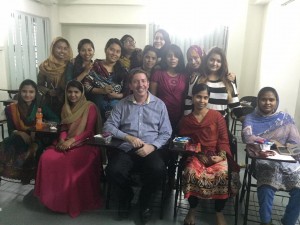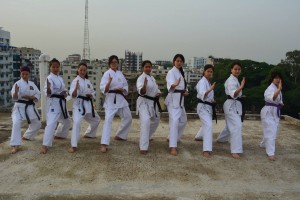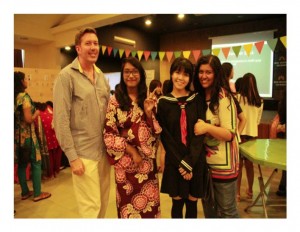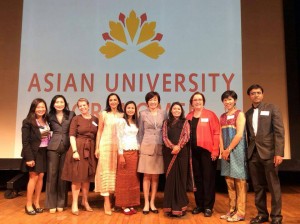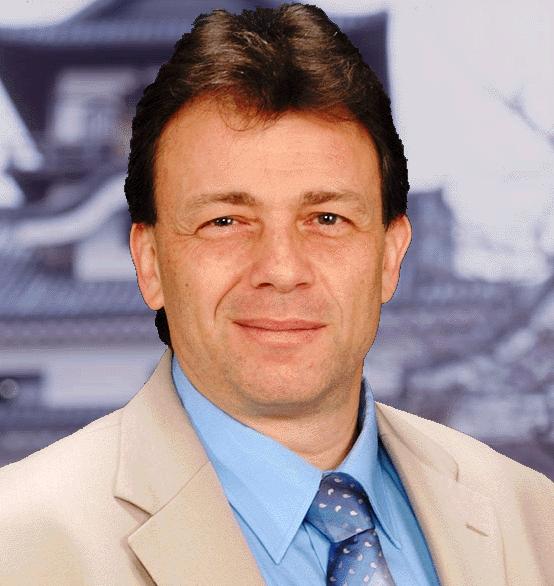By Mark Flanigan, Nagasaki (2000-04)
As a JET alumnus, I look back fondly on the four years I spent living and teaching in Nagasaki Prefecture. Serving on JET was, quite literally, one of those “life-changing” experiences, as it confirmed my career path in the direction of public service and global education. In the 15 years or so since my time in Nagasaki, I have been lucky to have had international roles in the U.S. government, in higher education, and at a private, Japan-focused non-profit foundation. I was even fortunate enough to return to Japan a second time, to earn my MA in Peace Studies in 2012 through the Rotary Peace Center at International Christian University (ICU) in Tokyo. Later, I served in a variety of roles in Manhattan with JETAANY between 2012-16.
My most recent career stage brought me back into the classroom, albeit in a different role and a new part of Asia for me. I am currently serving as a WorldTeach Fellow volunteer in Chittagong, Bangladesh, at the Asian University for Women (AUW). It has been both a challenging and rewarding transition back into teaching, as I felt a bit rusty in the beginning and took a bit of time to get back in the groove. Also, my main experiences with Asia had been almost entirely focused on Japan, China, and Korea. For me, South Asian history and culture was something I knew very little about up until a couple of years ago. Being here, I realized how comparatively little I knew about the diverse cultures of the Indian subcontinent of Asia. Nonetheless, it has proven to be an extremely rewarding transition, personally as well as professionally.
Me with some of my Pathways students in Bangladesh
Through a friend in New York City, I had first learned about AUW back in 2015. She had been a WorldTeach Fellow here a few years before, volunteering and having a really significant educational and cultural experience. The more I heard about her time in Bangladesh, the more I thought it sounded like a great opportunity to get back in the classroom while making a positive contribution to education for women at a significant institution like AUW. While I definitely enjoyed my four years in Manhattan, working as a Program Director with the Japan ICU Foundation (日本国際基督教大学財団), I also felt ready to take on a new challenge. I applied and was happily accepted as a new volunteer with WorldTeach, and assigned to AUW for the 2016-17 academic year.
AUW was founded in 2008 as a regional hub to help educate underprivileged women throughout different regions of Asia and the Middle East. With a liberal arts curriculum that promotes critical thinking and women’s empowerment, it is a truly encouraging place for young women who have faced numerous challenges in life due to poverty, gender bias, and sectarian conflict. With 600 students (and over 400 alumnae) from 15 different countries, including Nepal, Bhutan, Myanmar, Vietnam, Cambodia, Sri Lanka, Afghanistan, Pakistan, Syria, Palestine, and others, AUW is an amazingly diverse place. The dynamic environment, small class sizes, and daily interaction of people with many different ideas, perspectives, and cultures makes it an esteemed center of higher education in South Asia.
However, I almost missed my chance to be here. Less than one month before I was due to arrive at AUW, we heard the news of the terrible attack in Dhaka, the capital city of Bangladesh. All I knew was that international residents of the city (and their local friends and colleagues) had been targeted specifically in a vicious terror strike. The attackers, while a definite minority in terms of the general population, were sending a very clear and deadly message. Although the attack did not take place in Chittagong, it was great cause for concern among both WorldTeach and AUW staff, as well as present and future volunteers. At that time, it was not clear whether we would still be able to serve in Bangladesh, or how the program might proceed. Many safety protocols would need to be analyzed and revised before a final decision could be made. In the end we were still given the option to come, which I was definitely happy to hear.
I have now been here for seven months, teaching two different groups of students over the autumn and now spring terms. My classes are part of the Pathways for Promise Program at AUW, which is the recently developed entry point for women who have not had as much formal preparation to succeed in higher education. Many of them have come as former workers from the garment factories of Bangladesh, while others are daughters of Grameen Bank loan recipients, refugees from the persecuted Rohingya community, as well as indigenous minorities from the Chittagong Hill tracts region. In addition to Bangladeshis, Pathways students have come from Afghanistan, Cambodia, and Myanmar. They will take classes for approximately one year in Reading and Writing as well as Listening and Speaking, and also study Math and IT while participating in Community Time and Social Mentoring workshops and events.

A lovely display of Bengali cuisine
If they complete the Pathways Program successfully and meet all the exam requirements, they will advance to the one-year Access Academy and then an additional three years of undergraduate study at AUW. In all, the successful ones will graduate in five years with their bachelor’s degree in hand. Against all odds, this is their big chance to earn their college degree. Without the encouragement and funding support to match their own amazing dedication, it would most likely be impossible. It will not be easy for them. Many are far away from home and spend almost all of their time on the small but secure campus. They live in dormitories with 2-5 students per room, eat in the dining hall, and take all their classes together, so there is very little time for privacy or quiet reflection. Nonetheless, they are very eager to learn and make the most of this unique opportunity they have been granted.
It goes without saying that my students inspire me each and every day. Teaching them is really one of the biggest joys of my life here, and in many ways takes me back to my first experience teaching overseas in Japan. Although those two times are separated by about 15 years and many more miles, there are also some interesting parallels between them. Of the many things I have discovered over my time here thus far at AUW, one of the most interesting has been the surprising number of existing connections here between Bangladesh and Japan. As a former JET who later studied at ICU and worked to promote increased U.S.-Japan ties, it’s been a really pleasant surprise to find out about and help to build on these great bilateral bonds of friendship.
The first one, I discovered quite by accident. In the early part of the autumn semester, I was walking in the hallway outside of my office when I heard the distinct counts of “ICHI, NI, SAN, SHIIII!!” emanating from the level above. Intrigued, I climbed the staircase up to the next floor and was surprised to discover the gymnasium filled with perfect rows of students. They were in straight lines, balanced in strict stances, with fists alternately chambered by their side and then thrust forward in a crisp motion I instantly recognized. My mind wandered back to our small dojo in Hirado City, Nagasaki, where I spent countless hours drilling in those very same “kihon” movements. I was curious to find out more, so I made arrangements to return and observe a longer class in session.
It was then that I met Ms. Maria Chakraboty, their instructor, a remarkable woman from Bangladesh who has achieved her 5-Dan rank in Shotokan Karate. Maria serves as a real inspiration to her students, as AUW’s Associate Director of Physical Education and Karate instructor. Maria grew up in Chittagong, the same city where AUW is based, and faced hardships of her own due to people judging her negatively by her gender. She was strongly discouraged by others in her pursuit of Karate, but through the encouragement of her instructors, she has achieved a remarkable number of accomplishments. For her students, Maria is a living, breathing example of a successful adult woman, who has faced down discrimination and has continued her own personal growth through embracing the Japanese art of Karate. She has been able to impart her wisdom and experience to hundreds of young students through the years. Such is the wonderful environment of a cross-cultural, liberal arts university like AUW.
Maria (Center) training with some of her AUW students
In addition to Karate, there are other tangible bonds of kizuna between AUW and Japan. Attending the University’s Club Fair this past autumn, I was happy to learn that AUW students are involved in all kinds of social and academic club activities. Similar to Japan, students here balance their time between formal classes and organized clubs, like Model UN, Animal Welfare, a variety of sports, and other pursuits. Most interestingly to me, I discovered that there is a very active group of students on campus who are involved in the AUW Japan Circle Club! They are extremely genki and know an amazing amount of things regarding Japanese culture. They study Japanese on their own (as it is not taught here), read manga, watch anime, and even make their own kimono and other clothing by hand! Upon meeting them, I shared my experience as a JET alumnus and former ICU graduate student. They asked me to serve as their faculty advisor, to which I most happily agreed!
With some of the AUW Japan Circle Club students (and their hand-made clothing)!
I have been very happy to be working with them on various projects here this term. Most specifically, we have planned and organized a Japanese book drive among some of my colleagues and friends in Japan and Hong Kong. Through their kind and generous help, we have now received about seven boxes full of manga, books, magazines, language textbooks, and Japanese-English dictionaries from abroad! All of these were donated to the AUW library, so students can access them freely anytime. As none of our students have been able to visit Japan as of yet, they really love the chance to see any kind of “hon mono” firsthand. One Tokyo friend in particular also sent a variety of delicious Japanese candies, which were a big hit with the students! We are still interested in receiving any other items from Japan, if anyone would like to donate. Additionally, the students performed a number of Japanese songs (in Japanese) and dances for our recent Lunar New Year Festival. We hope to develop exchange partnerships with AUW and universities in Japan, in order to offer study abroad opportunities in both directions. Interestingly, at least one AUW alumna is now studying in Japan, earning her Master’s degree at the United Nations University (UNU) in Tokyo!
Lastly, there is a very robust level of support for AUW in Tokyo. As part of the global support network for AUW students, a number of highly-accomplished and very influential donors make up the “Friends of AUW Japan” organization. Among them is Ms. Kathy Matsui,Vice Chair of Goldman Sachs Japan,who has a long and deep connection to AUW. In 2007, she was chosen by the Wall Street Journal newspaper as one of the “10 Women to Watch in Asia” for her work on the “Womenomics” theme, and serves as a board member of the AUW Support Foundation. Ms. Matsui and her husband, Mr. Jesper Koll, have been major donors to AUW since its inception, and they continue to look for ways to promote exchange between AUW and Japanese universities and companies. In addition, First Lady Akie Abe serves as an official Patron of AUW and has been actively involved with a number of fundraising efforts on behalf of the university in Tokyo over the past few years. Lastly, AUW has enjoyed very generous support through the past several years from a number of Japanese companies like HITACHI, MITSUI & CO., TOSHIBA CORPORATION, and UNIQLO.
First Lady Akie Abe (center) and Ms. Kathy Matsui (second from right)
In conclusion, I would say my time here in Bangladesh has been a wonderful journey thus far. In many ways, it’s a completely new (and sometimes bumpy) experience for me, living in South Asia and in a developing, Muslim-majority country for the first time. Culturally, it’s much different than what I was used to, but that’s been a good opportunity to broaden my own horizons and question my preconceived notions about life as well. My students in the Pathways for Promise Program specifically, and AUW students in general, have taught me so much and really inspired me through their own energy, resilience, and desire to learn. As a nice coincidence, this latest chapter in my career also brings me back to teaching and to Japan in many ways. I am happy to have so many “natsukashii” moments here, to help teach these remarkable young women, and also to be in a position to try and advance the relationships between people in Bangladesh and Japan. In some ways, it’s the most unexpected yet personally satisfying addition to my time here at AUW. I’m happy to make the most of all these fortuitous connections during my time here in Bangladesh and beyond.
=================================================================================
Mark Flanigan is currently a WorldTeach Fellow volunteer in Chittagong, Bangladesh, at the Asian University for Women (AUW). Mark served as an ALT in Nagasaki Prefecture from 2000-4, and later studied for his MA in Peace Studies as a Rotary Peace Fellow at the International Christian University (ICU) in Tokyo from 2010-12. After graduating from ICU in 2012, he spent four years working for the Japan ICU Foundation in NYC. He has also held leadership roles in the JET Alumni Associations of both New York and Washington, DC. He can be reached at markinmitaka(at)gmail.com

Life After JET: Patrick Finn
By Jon Dao(Toyama-ken, 2009-12) for his podcast Discussions with Dao. Jon works as a speech coach andpersonal trainer.
Fresh off the plane (okay maybe more like a few weeks) from a 5 year stint in the JET Programme, here’s graphic designer Patrick Finn! Be sure to follow him on Instagram and Twitter.
The “Best Thing” being back (1:20)
Using Credit Cards Over There (4:10)
Music/Concerts in Japan (8:38)
Japan Apologists (15:20)
Why do the JET Program? (17:10)
What kept you going for 5 years? (20:10)
Is JET “worth it” for personal and professional development? (26:41)
“Just living alone and kind of having to start fresh, I could throw away any ties I had to people, right? Okay, I can finally be me. No one expects anything of me because they don’t know me. So I don’t have to live up to anyone’s expectations. Be 100% me and build my reputation around that.”
Traveling “Outside” (31:17)
Silence on the Struggle (33:07)
“You HAVE TO be a go getter, otherwise it’s not going to happen to you.” – @PMF1030 #hustle What is “it”? You decide!
— Jon Dao (@CommDao) August 10, 2016
Get the Pension Refund (37:40)
Fan Question (40:32)
Tomorrow I #podcast with graphic designer and recent #Japan returnee @PMF1030. Former JETs and current JETs, send… https://t.co/1OnIcM2rMp
— Jon Dao (@CommDao) August 8, 2016
“If you find yourself doing things that you could’ve been doing where you came from, You shouldn’t be there. You’re making a mistake. You’re not making the most of your time, and you’re wasting someone else’s opportunity.”
AJET Professional Development Call with JET alum Anthony Bianchi
On May 7th, we held our fourth AJET Professional Development Conference Call. Our guest speaker was former JET, Mr. Anthony Bianchi (Aichi-ken, Kiyosu City, 1989-91) who now serves as a city council council member in Inuyama City, Aichi prefecture. Mr. Bianchi is often highlighted in the Japanese media and is well-known for being the first American-born elected official in Japan. Click here to read a short interview with him on AJET.net.
Mr. Bianchi discussed the inner workings of his current position, various initiatives to improve English and international communication in his community and how JETs can potentially get involved with local politics in their communities.
Click here to listen to the recording of the call on the AJET website: http://ajet.net/2014/05/13/professional-development-call-anthony-bianchi/
Kitcher’s Café #003: Making the Most of Your Network
Kitcher’s Café, a new series by Lana Kitcher (Yamanashi-ken, 2010-12) is an assortment of articles, topics and commentary written for the JET Alumni community. Lana currently serves as the Business Development Associate at Bridges to Japan, a New York-based cross-cultural consulting firm founded by JET alum Jennifer Jakubowski (Hokkaido, 1995-97).
Dear recent JET returnees and current “job hunters,”
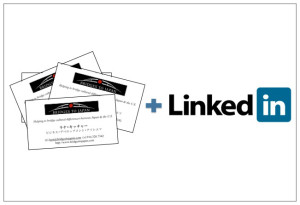 I was given the opportunity to speak at the JETAANY Career Forum in New York City a few weeks ago. Approximately 25 recent returnees (plus JET alumni going through a career transition) attended the event and were able to learn from the presenters, and also from one another, about how to successfully land a job in today’s economy. We learned that it is important to keep strategies current as technology continues to change and as the methods of yesterday are not necessarily effective for our search today.
I was given the opportunity to speak at the JETAANY Career Forum in New York City a few weeks ago. Approximately 25 recent returnees (plus JET alumni going through a career transition) attended the event and were able to learn from the presenters, and also from one another, about how to successfully land a job in today’s economy. We learned that it is important to keep strategies current as technology continues to change and as the methods of yesterday are not necessarily effective for our search today.
I would like to share with you some of the points from my presentation called “Making the Most of Your Network,” in case some of you are also going through this transition now. When I first returned home from the JET Program I had a really difficult time figuring out how to start the job search. At that point my only full-time job had been teaching English in Japan, and I didn’t know how to start looking for a new job from scratch. It took me until mid February to get a job, and I really wish someone had told me what I needed to hear earlier.
JETwit Career Update 11.09.11
JETwit Career Update is a new feature where JETwit will list any JET alums who have recently (loosely interpreted) found a new job, gotten a promotion, started a new business, been elected to an office, started a new grad program or have any other career developments to share. You probably see lots of job listings, so I thought it would also be interested to know who’s finding work and what kind of work people are finding.
Let us know about yourself or fellow JET alums by sending an e-mail to jetwit [at] jetwit.com. (Make sure to include prefecture and years on JET. And of course mention if you found your job via JETwit or JETAA listings or connections.)
- Rob Cornilles won the Republican primary for the Congressional seat vacated by David Wu (D-Oregon), who resigned due to allegations of inappropriate sexual behavior. If Rob, who lost to Wu in the last election, wins this election, he would be the first ever JET alum to hold a seat in the U.S. Congress.
- Kiesha Speech (Nagasaki-ken, 2000-02) was elected to the Oak Park School Board last night in Oakland County, Michigan. (http://detnews.com/apps/pbcs.dll/section?Category=POLITICS01) (https://www.facebook.com/#!/kieshaspeech)
- Olivia Nilsson (Tokushima-ken 2006-08) reports she has left her position at the New York Bureau of the Yomiuri Shimbun after three years covering business and economic news. She’s now working as a researcher at Blue Heron Research Partners in NYC.
- Elizabeth Gordon of JETAA Chicago reports: “I am the new Director of Private Events at the Adler Planetarium – totally different from what I was doing, but very exciting!”
- Daniel Sturgeon, a Political Analyst and Speechwriter at the Consulate General of Japan in Atlanta who also previously worked as a Chunichi/Tokyo Shimbun staff reporter in D.C. says: “My last three jobs have been Japan related and were found either at JETwit or the JETAA network.” Daniel also mentioned that he is now a Rotarian, so if anyone is interested in applying for their scholarship, he’s a point of contact.
- Shane Taber (Monbusho English Fellow, Nara-ken, 1979-81) says: “After a nearly 30 year “break”, 4 kids (now all grown), plus years of public school teaching innorthern California, I am happily back in Kansai teaching full time at Kobe College High School for the next several years. While I became aware of this job opening through other sources, this teaching position was also listed in JETwit’s job section in 2010. Of course, having been an MEF was a big plus in landing this position, I’m sure! I’d love to hear from other former MEFs from the late ’70s/early ’80s who are also in Japan now.” (JETwit note: There’s a LinkedIn group for MEFs. Please join if you haven’t yet!)
- And Kay Munroe-Johnson in Atlanta says: “This is great to see! I rejoice with all of you in achieving such great job success! Maybe I will have a report to share soon as I am looking for a job in (near Atlanta). Thanks JetWit for your dedication and support of all of us JET Alums!”
- And Greg Beck (CIR Hiroshima-ken, 2006-11) (listed in the previous JETwit Career Update) says: “It is great not just to be employed, but to work in the field I love, not just for a paycheck. That’s a tragically rare thing right now, and a huge concern I had as my JET career wound down. Basically, JETwit ROCKS!”
JETwit Career Update is a new feature where JETwit will list any JET alums who have recently (loosely interpreted) found a new job, gotten a promotion, started a new business, started a new grad program or have any other career developments to share. You probably see lots of job listings, so I thought it would also be interested to know who’s finding work and what kind of work people are finding.
Let us know about yourself or others by sending an e-mail to jetwit [at] jetwit.com. (Make sure to include prefecture and years on JET. And of course mention if you found your job via JETwit or JETAA listings or connections.)
- *Greg Beck (CIR Hiroshima-ken, 2006-11) – “Thanks in large part to JETwit’s jobs section, I am now living in NYC and working for TBS as an associate producer! “
- Darrell Allen (Monbusho English Fellow, Saitama-ken, 1984-85) – ” This past August, I moved from Seattle to Durango, Colorado to accept a position as Visiting Assistant Professor of History at Fort Lewis College. Currently, I am teaching two sections of East Asian Civilizations I, and a class entitled “From Anime to Rampaging Monsters: An Introduction to Japanese Pop Culture.” Next semester I will do two sections of East Asian Civilizations II, and one of Modern Japanese History.”
- *Karl Rahenkamp (Fukui-ken, 2003-08) – “In mid-September I started (finally, after 2 years of near unemployment) working as a dormitory supervisor at 慶應義塾ニューヨーク学院 (Keio Academy New York).”
- *Justin Maki (Osaka-fu, 2002-06) – “I got a job through JETWit — the Assistant Sports Correspondent position at Kyodo News Agency, forwarded back in August by JET alum Scott Dixon. I was still living in Denver at the time of the job posting, but decided to submit a cover letter and resume because my University of Colorado job was coming to an end. Kyodo News did a phone interview with me in early September, invited me toNew York for an in-person interview, and notified me a few weeks ago that I got the job! It’s a job that seems like a perfect fit for a JET alum– now there are three of us in the same office.”
- Lyle Sylvander (Yokohama-shi, 2001-02) – Started grad program at Columbia’s School of International & Public Affairs
- Steven Horowitz (Aichi-ken, Kariya-shi, 1992-94) – Grant writer for the Jewish Outreach Institute (www.joi.org)

